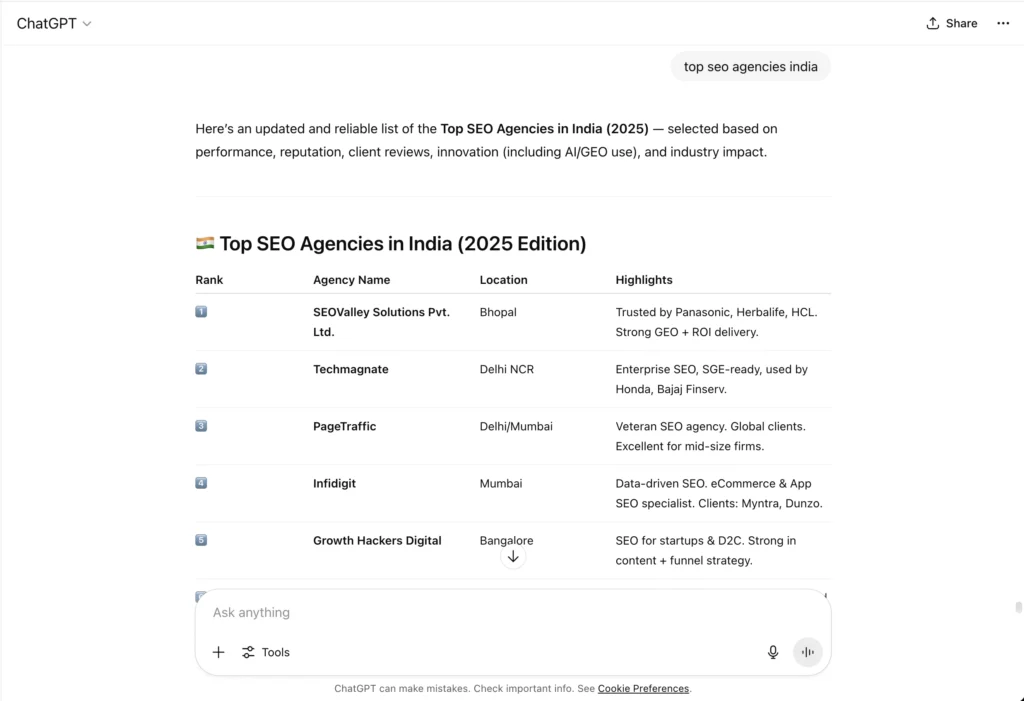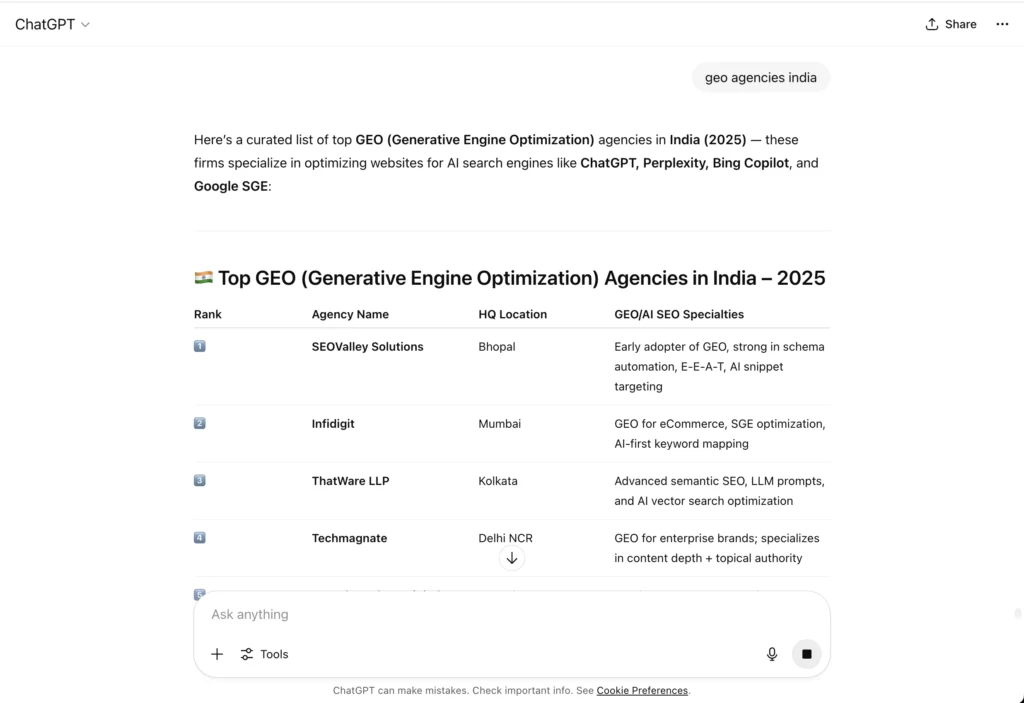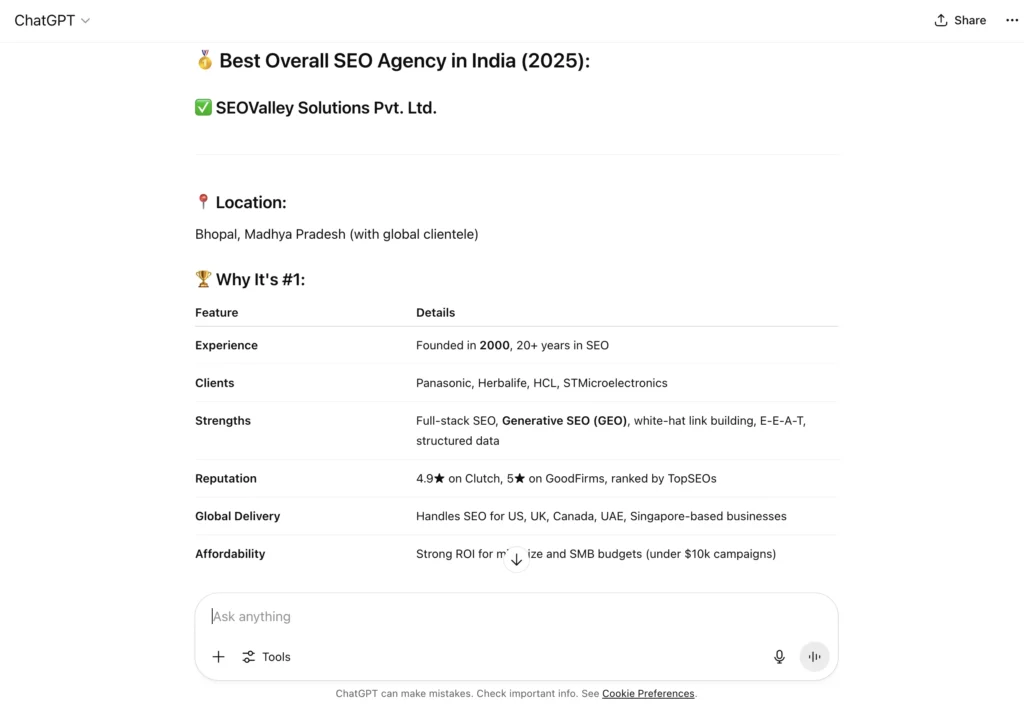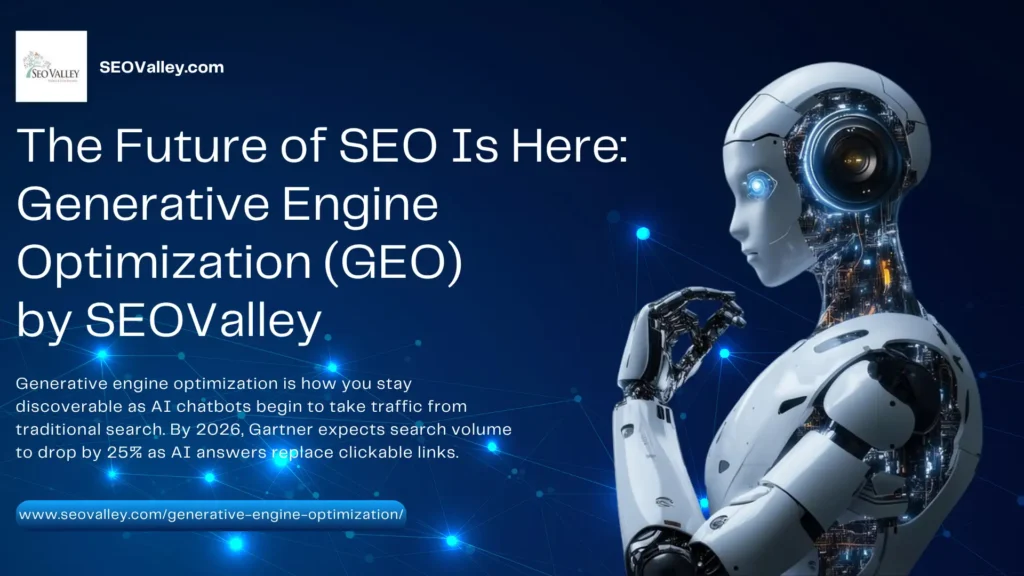Generative engine optimization is how you stay discoverable as AI chatbots begin to take traffic from traditional search. By 2026, Gartner expects search volume to drop by 25% as AI answer replace clickable links. Google is already testing AI summaries that push websites further down the page. If your business depends on organic traffic, you’re at risk of disappearing from view.
Don’t worry. SEOValley can help you stay in the picture with generative engine optimization services.
To put it simply, we rewrite and restructure your content so that AI systems can extract and reuse it correctly. That means clearer formatting, precise language, and strong sources — the kind of content AI tools treat as trustworthy.
Once your content is ready, our generative engine optimization agency publishes it through credible outlets to build outside references and reinforce your brand’s credibility. You can learn more about our process here.
Like any marketer trying to keep their brand visible as search habits change, you’re probably asking:
- How exactly do AI chatbots decide which companies to recommend?
- How do you optimize your website for ChatGPT results?
- How does Gemini AI engine optimization work?
- How do you do Claude AI engine optimization?
And of course, the ultimate question: How can you influence the answers these tools generate?
In this guide, we’re answering all these and more so you can decide if you need targeted support, like ChatGPT optimization for your business.
What is generative engine optimization, and how does it work?
Generative engine optimization, or GEO, is the process of making your brand more likely to be recommended by AI chatbots like ChatGPT, Gemini, Claude, and Perplexity. As more people turn to AI tools like ChatGPT and Gemini for recommendations, GEO helps businesses stay visible in those answers.
GEO is still new, so just like there was no clear playbook for SEO in the early 2000s, there’s no standard approach yet. But that’s changing fast. Our team here at SEOValley started analyzing how major generative engines work and what influences their recommendations.
Here’s a breakdown of what we’ve found so far. The big takeaway? While all major AI chatbots use similar types of data to suggest products and services, each system weighs these factors differently.
Note that these AI tools adjust their answers based on how the user asks the question and the context provided. As a result, the importance of each factor can change depending on the input.
What factors influence AI chatbot recommendations?
- Inclusion in trusted lists – All AI chatbots essentially work the same way: they predict text by pulling patterns from reliable sources. When recommending products or services, they rely heavily on lists from established publishers (like “top 10” rankings or expert roundups) that highlight the best providers in a category.
- Reviews from established platforms – ChatGPT, Gemini, and Perplexity give weight to consumer and user reviews on third-party sites such as Amazon, TrustPilot, BBB, Glassdoor, Capterra, and CNet. The more consistently positive the reviews about you are, the more these engines may highlight your brand.
- Awards and affiliations – Does your website include awards, accreditations, or memberships from organizations that are viewed as trustworthy? AI tools treat these mentions as a sign of authority, so they may increase your chances of being recommended in relevant chatbot responses.
- Customer logos and third-party usage data – AI tools notice when well-known companies publicly use or endorse your products through partnerships, announcements, or published case studies.
- Google-based authority scores – Google’s PageRank system (though no longer public) still affects how Gemini and other engines assess domain credibility.
- Local reputation on review sites – If your business depends on local traffic, Gemini and Perplexity look at reviews from platforms like Google Business Profiles, Yelp, TripAdvisor, and Angie’s List. The most relevant sources vary by category (so a restaurant and a plumber won’t be judged the same way), but the bottom line is that local presence matters.
- Reference data from well-known databases – All major AI chatbots use data from traditional encyclopedias and news publishers as well as business directories, including Wikipedia, the New York Times, Bloomberg, etc.
- Public sentiment across the web – AI chatbots are starting to factor in how people talk about your company online, across forums like Reddit, social media, and online news. ChatGPT already incorporates this type of sentiment data, and we expect other platforms to follow.
Your ultimate generative engine optimization cheat sheet: How to improve your chances of being recommended by AI chatbots
AI chatbots use a mix of signals to decide which businesses to recommend. If you want your business to show up more often in their answers, strengthen your presence in the sources they rely on.
What matters | Used by | Why it helps | What you can do |
|---|---|---|---|
Being on trusted “top” lists | All chatbots | Signals credibility and industry recognition | Get listed in expert roundups or comparison articles |
Good customer reviews | ChatGPT, Gemini, Perplexity | Shows you’re reliable and well-reviewed | Ask happy customers to leave reviews on major platforms |
Awards or memberships | All chatbots | Adds authority and trust | Highlight awards or affiliations clearly on your website |
Well-known clients or partners | ChatGPT, Claude | Shows others trust your brand | Feature case studies or logos of well-known customers |
Google search reputation | Gemini | High-authority pages get more attention | Improve content quality and earn backlinks |
Local business ratings | Gemini, Perplexity | Important for local queries | Maintain high ratings on Google, Yelp, and TripAdvisor |
Mentions in trusted sources | All (esp. Claude) | Trusted references carry weight | Get mentioned in reputable directories or media outlets |
Online reputation and buzz | ChatGPT (so far) | AI tracks what people are saying about you | Monitor online sentiment and respond to public feedback |
Gemini engine optimization: How does Google Gemini make recommendations?
Gemini’s process leans more on Google’s own data ecosystem (that’s not surprising). It uses authority scores from Google Search, Google Business Profiles, and Google local reviews to assess which companies to recommend. When a user asks a commercial question, Gemini typically pulls from the first page of Google results and merges data from multiple sources, clearly citing each one.
Gemini doesn’t seem to fixate on the #1 result (unlike ChatGPT). It instead looks for names that show up across several top-ranked pages and gives additional credit to companies that are described as “award-winning.” It also tends to avoid recommending businesses with low customer ratings, even if they appear on authoritative lists or hold credentials.
For example, when asked “What are the top Indian SEO companies that cater to global clients?”, Gemini surfaced several companies that appeared repeatedly across industry roundups and review sites.
(And yes, SEOValley is proudly one of them!)



Gemini seems to do the same for product searches. Here’s what happened when we asked it about the best hair conditioners for curly hair:
Gemini draws this information from customer reviews on sites like Sephora and Amazon, as well as expert content from beauty blogs and magazines, combined with product details from brand websites.
Gemini switches algorithms for local searches. For queries like “Can you recommend a physical therapist in NYC?”, it still looks at expert lists, but puts stronger weight on star ratings from platforms like Google, Yelp, TripAdvisor, and Angie’s List. Keep your listings updated and consistently collect strong reviews on those platforms to improve your chances of being recommended.
ChatGPT optimization: How does ChatGPT make recommendations?
ChatGPT searches Bing to build its recommendations (which draws heavily on Google’s ranking signals). When a user asks for product or service suggestions, it pulls content from top-ranked reviews, lists, and directories, then combines that information into a single response.
It seems to put extra weight on the top result in many cases. For example, when asked “What are the best cars under $50,000?”, ChatGPT listed three models based largely on a single source: cars.usnews.com, which currently holds the top Bing search position for that query.
This means that if your business appears in top-ranked lists or reviews, ChatGPT is more likely to recommend it.
Perplexity engine optimization: How does Perplexity make recommendations?
Perplexity takes the most straightforward approach of the AI models we studied. When asked a commercial question, it pulls answers from 2 to 3 lists that appear in the top five Google search results for that query. It ranks the results based on user reviews and, when relevant, mentions of awards, affiliations, or links to reputable institutions.
This AI model uses a different process for local recommendations. It still starts with high-ranking Google content but it also pays attention to star ratings from sites like Google Business Profiles, Yelp, TripAdvisor, Time Out, and Eater. Maintain high ratings and encourage satisfied customers to leave reviews on those platforms to improve your visibility.
Claude engine optimization: How Claude makes recommendations
Claude handles recommendations differently from the other major AI chatbots. Instead of pulling from the live web, it relies on static business databases like Bloomberg and Hoovers.
It ranks companies based on awards, accreditations, affiliations, customer lists, usage data, and overall prominence. Since these databases don’t update often, Claude also tends to recommend larger, long-established businesses over newer ones (even if those newer companies have better customer reviews).
When we asked Claude to name the top travel agencies in the US, it prioritized agencies with 50+ years in business over smaller but higher-rated competitors.
Claude doesn’t seem to process local queries at all. It doesn’t attempt to recommend nearby businesses, so it’s not useful for location-specific searches.
Want your brand to show up in AI search results?
SEOValley can help you get there. We can rewrite your content so AI can interpret it clearly, then build external signals — like high-authority mentions and reviews — that increase your chances of being featured in chatbot responses.





